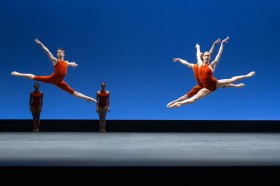Having three kids within three years would take a toll on any mother but add in a dancer’s physical regime and the complexity of a performer’s hours and life can become very complex.
Former Australian Ballet principal dancer Olivia Bell spent four and a half years balancing her roles of mother and dancer but towards the end things became ‘too difficult’.
‘Perhaps [my] priorities changed’, said Bell, who retired late last year, after finding it too hard to find a balance that satisfied the demands of ballet and the needs of her children Anouska, Gabriel and Rafael.
During seven-week tours to Sydney twice a year, Bell constantly stayed in touch with her family. Her self-employed husband, Nicholas, became a ‘mummy-daddy’ whose flexible schedule helped in managing the logistics of her travel. But when Nicholas’ own demands increased, the family relied heavily on nannies and carer support.
She negotiated a deal with the Australian Ballet so that while on tour, she could miss Saturday night performances to fly home to her kids. The travel, however, was both physically and mentally taxing, so Bell was constantly re-evaluating her situation.
She also had strong support from the Australian Ballet. Bell spoke highly of the Ballet’s Artistic Director, David McAllister, who she said was patient, open to communication, and understanding of her predicament. At the same time, Bell knew ‘he needed to get results’.
Since making the move to fulltime motherhood, Bell has been enjoying more family time. She’s happily informed her kids who were often asking who’d be meeting them at the end of kinder each day, that she’ll be there, which she said will provide ‘a nice consistency’.
But Bell emphasised the decision to retire was ‘very personal’ and while motherhood ‘certainly contributed to [her] retirement decision’ it was not the only factor. She’s glad she retired at a time when ‘people wanted to see more of me’, and that it coincided with ‘what was best for the five of us’.
Dancers not infrequently retire in their thirties but for actors the expectation to keep working is greater. A good support system is the number one factor that enables Perth-based actress, Rebecca Davis, and her actor husband, to manage busy rehearsal and production schedules.
Davis comes from a theatrical family so her parents are understanding and happy to be on-call for regular child-minding duties, as are her in-laws. Yet despite their ongoing support, Davis said there were times when balancing motherhood and performance was very difficult. ‘I can’t say it hasn’t taken its toll at times.’
A regular performer with Western Australia’s Black Swan State Theatre, Davis spoke highly of Artistic Director, Kate Cherry, who having a young child of her own is ‘keenly aware’ of the difficulties mothers face.
Davis said ‘the whole company is very supportive’ and mentioned the beginnings of promising discussions at Black Swan on how best to support and empower mothers to manage their time and dual-loves.
But times are particularly tough during production week, which involve many long days and late nights. Tours are another matter altogether.
Davis has had to choose her jobs wisely and make tough decisions about whether or not it is physically, emotionally, and financially viable for her to go on tour.
She cited an eight-week tour to Brisbane, which became a temporary relocation for the whole family. Her two children, aged three and eight, were home-schooled at their short-term Brisbane residence together with the son of fellow Black Swan actress, Michelle Fornaiser. But the move involved ‘a lot of juggling and sacrifice’ for all parties.
Fornaiser, whose husband Associate Professor Andrew Lewis is the Program Director of Performance at the Western Australian Academy of Performing Arts (WAAPA), called the whole balancing act ‘tricky’.
Unlike Davis, Fornaiser does not have parents nearby. In the past Lewis’ more local parents were available but she said family care is becoming ‘increasingly more difficult’ as his parents age. Times are especially demanding during WAAPA production weeks, which are a ‘logistical nightmare’.
Managing school nights and rehearsal periods is also becoming a rising challenge. Fornaiser mentions times when her son Sebastian has had to come into rehearsals due to ‘timing issues’ born out of a change of school. She has however, worked with ‘very understanding’ directors.
For both Davis and Fornaiser, the other significant issue is the nature of the work’s insecurity, which can be particularly hard for mothers in the creative industries needing to provide financially – and otherwise – for their dependents.
Davis said it’s ‘not like the public sector’ where maternity leave is offered, and noted the absence of holiday pay as another financial concern. While lucky to have family close by, babysitters have been necessary to fill in the gaps, the cost of which add up and demands further sacrifice.
Fornaiser said ongoing costs of babysitters, employed day and night for a performance season of seven to 10 das at a time, becomes incredibly expensive.
Davis wishes more support was around and said ultimately, playing mother and performer simultaneously is ‘only viable if you have a good support network’.





